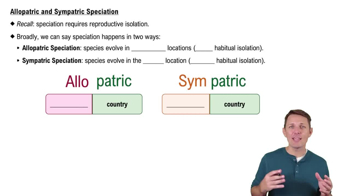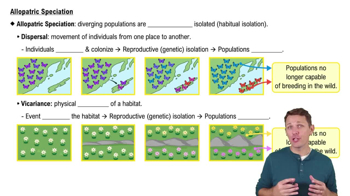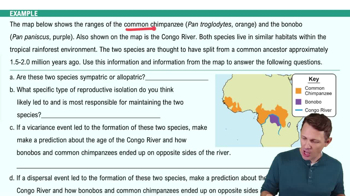Allopatric and Sympatric Speciation exam Flashcards
 Back
BackAllopatric and Sympatric Speciation exam
1/28
Terms in this set (28)
- Allopatric SpeciationSpeciation that occurs when populations evolve in different geographic areas, leading to reproductive isolation.
- Sympatric SpeciationSpeciation that occurs within the same geographic area, often through mechanisms like polyploidy or disruptive selection.
- DispersalThe movement of individuals from one place to another, leading to geographic isolation and potentially allopatric speciation.
- VicarianceThe physical splitting of a habitat, resulting in geographic isolation and potentially allopatric speciation.
- PolyploidyA condition in which an organism has more than two complete sets of chromosomes, often leading to sympatric speciation.
- Disruptive SelectionSelection for divergent phenotypes within a population, which can lead to sympatric speciation if accompanied by reproductive isolation.
- Reproductive IsolationA state in which two populations can no longer interbreed, leading to the formation of new species.
- What is the main difference between allopatric and sympatric speciation?Allopatric speciation occurs in different geographic areas, while sympatric speciation occurs in the same geographic area.
- What role does mate choice play in sympatric speciation?Mate choice can lead to reproductive isolation within the same geographic area, contributing to sympatric speciation.
- Founder EffectA reduction in genetic diversity that occurs when a small population colonizes a new habitat, often seen in dispersal events.
- What is autopolyploidy?A type of polyploidy that occurs within a single species due to a cell division error, resulting in extra sets of chromosomes.
- What is allopolyploidy?A type of polyploidy that occurs through hybridization between two species followed by a cell division error.
- How does vicariance lead to speciation?Vicariance physically splits a habitat, leading to geographic and genetic isolation, which can result in speciation.
- What is the significance of genetic isolation in speciation?Genetic isolation prevents gene flow between populations, allowing them to evolve independently and potentially form new species.
- How can polyploidy create a new species in a single generation?Polyploidy results in extra sets of chromosomes, causing reproductive isolation from the original population and forming a new species.
- What is the role of microhabitat niches in sympatric speciation?Microhabitat niches can lead to reproductive isolation within the same geographic area, contributing to sympatric speciation.
- What is the difference between dispersal and vicariance?Dispersal involves movement to a new habitat, while vicariance involves the physical splitting of an existing habitat.
- How does disruptive selection contribute to sympatric speciation?Disruptive selection favors divergent phenotypes, and if accompanied by reproductive isolation, it can lead to sympatric speciation.
- What is habitual isolation?A form of reproductive isolation where populations reproduce in different habitats, often leading to allopatric speciation.
- Why is sympatric speciation less common than allopatric speciation?Sympatric speciation is less common because it is harder to achieve reproductive isolation within the same geographic area.
- What is the significance of gene flow in speciation?Gene flow between populations can prevent speciation by keeping the populations genetically similar.
- How does self-fertilization facilitate polyploidy in plants?Self-fertilization allows polyploid plants to reproduce even when they have extra sets of chromosomes, leading to new species.
- What is the role of a cell division error in polyploidy?A cell division error can double the number of chromosomes, leading to polyploidy and potentially new species.
- How does hybridization contribute to allopolyploidy?Hybridization between two species followed by a cell division error can result in an allopolyploid organism with extra sets of chromosomes.
- What is the outcome of a vicarious event in speciation?A vicarious event leads to geographic and genetic isolation, allowing populations to evolve independently and potentially form new species.
- How does the founder effect influence genetic diversity?The founder effect reduces genetic diversity in a new population, which can lead to rapid evolutionary changes.
- What is the importance of reproductive isolation in speciation?Reproductive isolation is crucial for speciation as it prevents interbreeding and allows populations to evolve independently.
- How can mate choice lead to reproductive isolation?Mate choice can result in individuals preferring to mate with similar phenotypes, leading to reproductive isolation and speciation.


